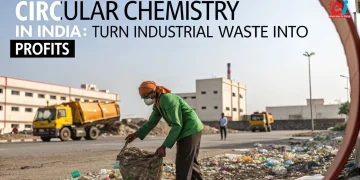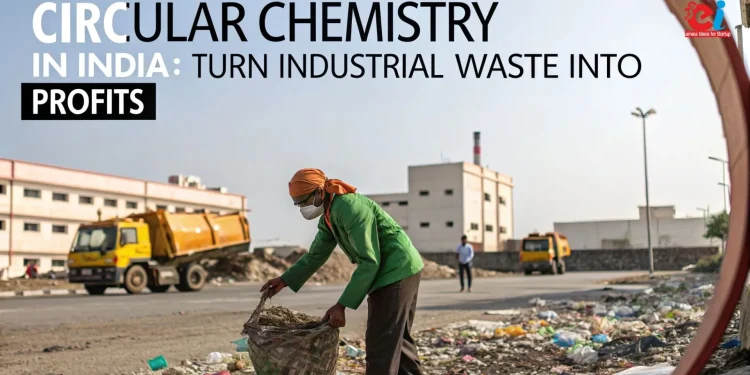While the global chemical industry is moving from linear to circular thinking, India is uniquely poised at the intersection of sustainability and innovation. Circular Chemistry, the practice of ‘upcycling’ waste streams into inputs, is particularly well placed to encourage MSMEs and startups to pursue eco-friendly business models. As reported in Chemical Weekly on June 3, 2025, circular economy models are no longer green ‘fads’ but rather emerging opportunities for growth.
India is the third largest producer of plastic waste, generating over sixty-two million tons every year. This figure does not account for the agro, industrial, and municipal waste that has the potential to be harnessed by forward-thinking entrepreneurs to manufacture bio-based chemicals, recycled intermediates, upcycled specialty ingredients, and other advanced materials.
What are the Benefits of Circular Chemistry?
Market Advantages
It allows differentiation in ESG (Environment, Social, Governance) compliant services, which are increasingly praised for their sustainability focus—particularly from B2B and B2C businesses.
Price Stability
Circular Chemistry lessens the volatility in raw material costs by recovering resources out of waste materials.
Global Opportunities
European and North American customers have begun requiring traceability of Circular Chemistry , increasing the global market demand for eco-friendly sourced materials.
Sustainable Solutions
Supporting green initiatives accelerates the use of closed-loop systems as driven by the EU Green Deal, Plastic Waste Management Rules, and Extended Producer Responsibility.
Primary Waste Streams for Circular Chemical Manufacturing
1. PET and PVC Plastics
- Can Be Turned Into: Pyrolysis oil (plastic-derived fuel), monomers like ethylene, propylene, and terephthalic acid
- Business Model: Establish depolymerization facilities for the plastic to chemical value chain
- Startup Opportunity: Lower temperature catalytic pyrolysis or solubilized recovery of polymers
Related: Feasibility and Techno-Economic Viability Study on PVC Coated Wires & Cables Industry
2. UCO (Used Cooking Oil) and Animal Biodiesel Fats
- Can Be Converted To: FAME (fatty acid methyl ester), biolubricants, and biopolymers
- Government Approved: Recognized feedstock for biodiesel and Sustainable Aviation Fuel (SAF)
- Entrepreneurial Point: Gather and refine UCO for chemical feedstocks of higher value
3. Municipal Solid Waste
- Can Be Used As: A feedstock abundant in organic biomass that could produce syngas, ethanol, or methanol
- Technology Used: Gasification, anaerobic digestion, fermentation
- Potential: Mobile modular waste-to-chemical facilities in secondary cities
4. Sugarcane Bagasse, Rice Husk, and Corn Stover
- Can Be Made Into: Furfural, lactic acid, xylitol, and levulinic acid
- Startup Fact: Each year, more than 500 million tons of agricultural residues go to waste in India
Related: Profitable Plywood Production from Rice Husk
5. Chemical Plant Wastewater and Spent Solvents
- Can Be Recovered As: Pure solvents from distillation, sodium sulfate, or ammonium salts
- Business Opportunity: Zero liquid discharge (ZLD) recovery systems of solvent extraction for in-house systems
6. Sludge Together with Catalyst Residues
- Precious Metal Recovery: From catalytic reactors, valuable metals such as platinum, palladium, and rhodium
- Circular Tech: Hydrometallurgy, bioleaching, solvent extraction
- Profitability: Profitable recycling opportunities because of scarcity and increased value of metal
Circular Products for New Venture Startups
- Bio-Based Surfactants and Plasticizers
- Hydrocarbon and Silica Based Waste
- Carbon Recovered Alumina
- Green Solvents such as Ethanol, Ethyl Lactate and Acetone
- Released acids (sulfuric acid and phosphoric acid)
- Polymer Screen Recovered Plastics and Composite Fillers
Tech and Innovation Levers
- Lower Thermal Chemical Convective Systems
- AI Powered Predictive Material Recovery & Waste Sorting
- Blockchain Circular Supply Chain Traceability
- Bioprocessing Microbial Consortium Fermentation
Supporting Ecosystem for India’s Circular Economy
- MoEFCC is deploying circular economy strategy targeting 10 industries like Circular Chemistry
- NITI Aayog promotes remanufacturing and material recovery parks in waste to energy
- Green credit program under carbon market scheme supports chemical recovery initiatives
- PLI program promotes specialty chemicals spurs innovation in waste to value
Startups Success Case Studies
- Pvt Ltd Green Joules – Provides industrial clients with green diesel from UCO
- Lucro Plastecycle – Sells reconstructed multilayer packaging waste to plasticized additives
- SustLabs – Circularity analytics using chemicals in water
- Gravita India – SME listed business that recycles lead and aluminium from industrial wastes
Problem Areas of Focus for Chemistry Circular System
- Variations in the composition of waste materials and impurities
- Separation, purification and recovery units capital expense is too high
- Decentralized waste aggregation and logistics
- Shortage of skilled personnel in process intensification and green chemistry
Financial Sustainability and Market Forecast
- The circular economy in India is estimated to reach USD 2 trillion by 2050
- The demand for bio-based circular chemical is increasing globally at a rate of 12% annually
- Startups are able to lower input expenses by 30–50% by employing circular feedstocks
- Investors focused on ESG and carbon markets are proactively financing projects aimed at valorization of waste
Strategic Business Models
- Waste-as-Feedstock Contracts: Guarantee supply contracts for a set term with municipalities or companies
- Utilize Product-as-a-Service: Market a function (for example, solvent cleaning) rather than a product
- License IP for Recovery Technologies: For new biocatalysts or reactors, license to more established firms for use
- B2B Marketplace: Trade of Circular Ingredients: Transaction between waste producers and buyers of chemicals
Conclusion
With circularity, India’s chemical manufacturing industry is being transformed. This evolution is not only about ecological stewardship, it’s a rethinking of the economy. Startups that capitalize on waste streams, advanced processing, and data-driven material recovery technologies can build high-margin, scalable businesses that secure resources for India’s future.
As India transitions from vision to execution in adopting circular economy principles, the nation’s business leaders are poised to spearhead the movement. Such a change is bound to transform the narrative around material chemistry and open up realms of infinite possibilities.
About NPCS
NPCS services include:
- DPR (Detailed Project Report) Creation
- Market Research Services
- Business Study Analysis
NPCS uses concepts like circular economies and green manufacturing to empower entrepreneurs and MSMEs with in-depth knowledge of project financing and plant set up consultancy, helping transform concepts into profitable businesses.


















